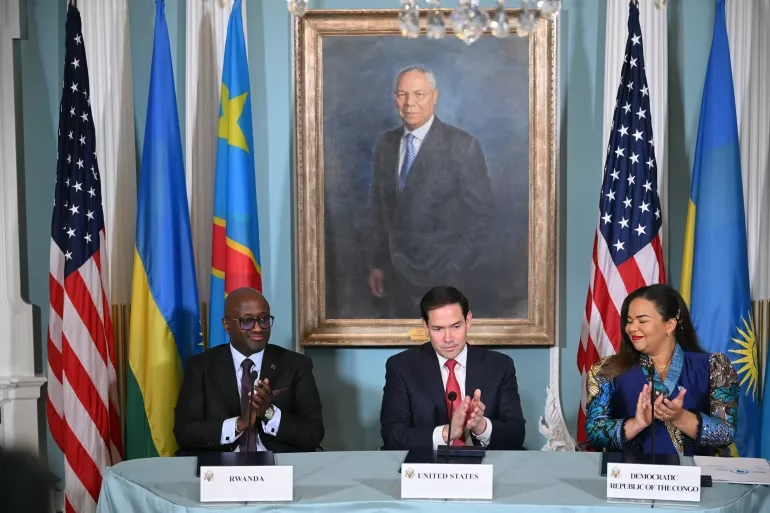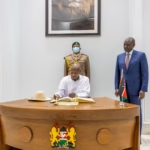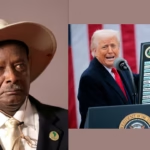US Secretary of State Marco Rubio, DRC Foreign Minister Therese Kayikwamba Wagner and Rwandan Foreign Minister Olivier Nduhungirehe at the signing a peace agreement on June 27
Aug 2 — Rwanda and the Democratic Republic of Congo on Friday agreed on an outline for the regional economic integration framework, according to the U.S. State Department, as the two countries take steps toward delivering on a peace deal signed in Washington in June.
The tenets agreed on Friday summarize the framework, which includes elements of cooperation on energy, infrastructure, mineral supply chains, national parks and public health, the State Department said in a statement.
Rwanda and Congo signed a peace deal in Washington in June at talks held by U.S. President Donald Trump’s administration, which aims to bring an end to fighting that has killed thousands and attract billions of dollars of Western investment to a region rich in tantalum, gold, cobalt, copper, lithium and other minerals.
As part of the deal, Kinshasa and Kigali agreed to launch a regional economic integration framework within 90 days, the agreement said.
A source familiar with the matter said a preliminary draft of the framework has been agreed to and there would now be an input period to get reaction from the private sector and civil society before it is finalized.
The framework is planned to be signed at a meeting of heads of state at the White House. No date has been set yet for that meeting, the source said.
In the Friday statement, Rwanda and Congo affirmed that each country has “full, sovereign control” over the exploitation, processing and export of its natural resources and recognized the importance of developing mineral processing and transformation capacity within each country, according to a copy seen by Reuters.
Kinshasa views the plundering of its mineral wealth as a key driver of the conflict between its forces and Rwanda-backed M23 rebels in eastern Congo.
Reuters reported in May that Congolese minerals such as tungsten, tantalum and tin, which Kinshasa has long accused neighbouring Rwanda of illegally exploiting, could be exported legitimately to Rwanda for processing under the terms of the deal being negotiated by the U.S., according to sources.
The two countries are committed to ensuring that the minerals trade no longer provides funding to armed groups and to create a world-class industrial mining sector in the region, as well as to ensure better cross-border interoperability on mineral supply chains, according to the statement.
They also agreed to connect new infrastructure to the U.S.-backed Lobito Corridor, underscoring Washington’s aim of greater access to resources in the region and efforts to counter China.
The Ruzizi III hydropower project and Lake Kivu methane exploitation were the only specific projects mentioned in the statement, despite U.S. emphasis on critical minerals. The countries said they intended to prioritize financing for Ruzizi and work together to exploit the methane gas sustainably.
Friday’s announcement comes after the two countries held the first meeting of a joint oversight committee on Thursday in a step toward implementing the Washington peace deal even as other commitments are yet to be fulfilled.
In the Washington agreement, the two African countries pledged to implement a 2024 deal that would see Rwandan troops withdraw from eastern Congo within 90 days.
Congolese military operations targeting the Democratic Forces for the Liberation of Rwanda (FDLR), a Congo-based armed group that includes remnants of Rwanda’s former army and militias that carried out a 1994 genocide, are meant to conclude over the same timeframe.
The deal also said Congo and Rwanda would form a joint security coordination mechanism within 30 days and implement a plan agreed last year to monitor and verify the withdrawal of Rwandan soldiers within three months.
But 30 days from the signing has passed without a meeting of the joint security coordination mechanism.
The source familiar with the matter said the joint security coordination mechanism meeting would be held on August 7 in Addis Ababa.
Congo is also involved in direct talks with M23 hosted by Qatar, and last month the two sides pledged to sign a separate peace agreement by August 18, though many outstanding details need to be negotiated.



